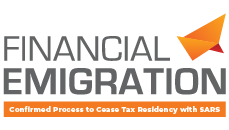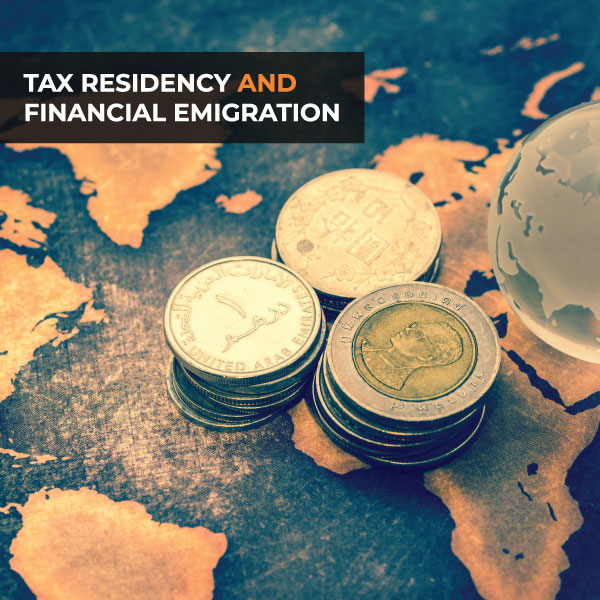TAX RESIDENCY AND FINANCIAL EMIGRATION
There is some confusion over how SARS determines whether someone is liable for local tax. In light of the uproar over the so-called “expat tax”, Mark Bechard unpacks the concept of tax residency and what financial emigration involves.
The capping of the “expat tax” exemption on 28 February next year has become a hot topic of conversation among South Africans who work outside of the country or who are considering availing themselves of supposedly lucrative foreign employment opportunities. A major benefit of these jobs has been the ability to use the exemption to pay no tax in South Africa on remuneration from foreign employment.
An amendment to the Income Tax Act will fundamentally change this exemption and many affected South Africans are looking for a way to escape the local tax that will become payable as a result. Some believe, or have been advised, that financial emigration is the solution. But this is not necessarily the case and – even where it may be appropriate – there is misinformation or confusion about what actually constitutes financial emigration. What will the tax amendment change and what will stay the same?
What does the exemption entail?
Currently, South African tax residents who render services outside of South Africa on behalf of an employer for more than 183 days during any consecutive 12-month period, and who render those services for a continuous period of more than 60 days during the same 12 months, do not pay any tax on their foreign remuneration. Both conditions must be fulfilled to qualify for the exemption, says Diane Seccombe, the national head of taxation at Mazars Academy. The South African Revenue Service (SARS) takes weekends, public holidays, annual leave and sick leave into account when calculating the 183-day and 60 days, says Seccombe.
From the 2020 tax year, the first R1 million of foreign remuneration that meets the requirements of the 183-day and 60-day rules will be exempt from local tax. Any foreign remuneration that exceeds this amount will be added to other local taxable income and taxed in terms of the individual tax tables, says Seccombe.
The “expat tax” exemption has always applied only to foreign remuneration, which includes salaries, leave pay, annual bonuses and fringe benefits – essentially income or benefits derived from an employer-employee relationship. The exemption has never applied to income received from foreign investments (foreign rental, dividends, interest or capital gains) or amounts from foreign trusts, she adds. The exemption (before and after the amendment) applies irrespective of whether or not the foreign services are performed on behalf of an employer that is based or registered in South Africa. The exemption applies only to employees; it does not apply to independent contractors. The point at which a “client” becomes an “employer” (and vice versa) can be difficult to determine and interpretation Note 17 (Issue 5) of March 2019 sets out the principles that SARS used to determine whether or not an employer-employee relationship exists.
The exemption also does not apply to remuneration earned by public officeholders appointed in terms of an Act of Parliament of for services rendered outside of South Africa on behalf of an employer in the public sector, including certain constitutional institutions and state-owned enterprises. (A full list of these entities can be found in the first, second and third schedules to the Public Finance Management Act.)
When the R1 million cap on the exemption is implemented next year, corporate consulting firm Probity Advisory says SARS will have the right to tax your foreign remuneration only to the extent that such income was not taxed abroad. For example, if your effective tax rate in South Africa is 45 percent but you are taxed 31 percent abroad, SARS will be allowed to tax your income at 14 percent to allow for a total effective tax rate of 45 percent. When it comes to converting foreign income to rands, Probity Advisors says taxpayers can use either the average exchange rate over 12 months or the spot rate on the day on which the remuneration was earned.
Who is a ‘tax resident’?
The Income Tax Act defines who is a “resident”. People who meet this definition are regarded as tax resident in South Africa unless deemed to be tax resident in another country in terms of a double-tax agreement (DTA) that South Africa has with the other country. In other words, a DTA overrides the Act’s definition of “resident” where the DTA differs from the Act, says Seccombe.
She says all taxpayers, whether resident or non-resident, may benefit from the application of a DTA. Where applicable, a DTA will override local tax legislation and permit one country to tax an amount and not the other.
Once tax resident in South Africa, Seccombe says taxpayers are subject to the residence-based system of taxation, which ensures that all income, irrespective of where in the world the income is earned, and all capital gains from disposal of assets, irrespective of where the assets are located, are subject to tax in South Africa, unless subject a DTA.
Non-residents also have tax obligations in South Africa but these are limited to being taxed on income derived from sources within South Africa and, essentially, capital gains from the disposal of immovable property in South Africa, say Seccombe.
In terms of the definition of “resident”, SARS regards you as tax resident if you are “ordinarily resident” in the Republic (test 1) or if you meet the requirements of what is called the physical presence test (test 2), says Seccombe.
The two tests are mutually exclusive. The physical presence test only applies once someone is not “ordinarily resident” in South Africa during a year of assessment, says Seccombe. This means that, until a taxpayer is no longer regarded as “ordinarily resident”, their residence status for tax cannot be determined by their physical presence (number of days) in South Africa.
She says that much confusion arises because the Income Tax Act does not define the term “ordinarily resident”, despite the concept being fundamental to the definition of “resident” To assist taxpayers, SARS issued Interpretation Note 3 (Issue 2) of June 2019, which states:
“[Ordinary] residence is the place where a natural person has his or her usual or principal residence, what may be described as his or her real home. Whether a natural person is ordinarily resident in the Republic is determined based on that person’s particular facts.”
Seccombe says the “particular facts” referred in the interpretation note and which SARS are “not exhaustive” and “only a guideline”, are nonetheless useful for providing an indication of factors that SARS will consider (and the taxpayer must prove) when determining whether a person meets the test “ordinarily resident”. These include “an intention to be ordinarily resident in the Republic”, “the status of the individual in the Republic and in other countries” and “the natural person’s nationality”.
The note goes on to explain that a natural person may be resident in the Republic even if that person was not physically present in the Republic during the year of assessment. “A physical presence at all times is not a prerequisite to being ordinary resident…The purpose, nature and intention of natural person’s absence must be considered as part of all the facts in determining whether that person is ordinarily resident.”
The key takeaway message is that simply working or living outside of South Africa for long periods does not in itself mean that SARS no longer regards you as ordinary resident.
The key takeaway message is that simply working or living outside of South Africa for long periods does not in itself mean that SARS no longer regards you as ordinary resident.
If you are not ordinarily resident during the year of assessment, SARS will apply test 2. You will still be regarded as a tax resident if, during that year, you were physically present in the Republic for:
- A total of more that 91 days; and
- A total of more than 91 days during each of the five years before the current year of assessment; and
- A total of more than 915 days during the five years of assessment before the current year of assessment. The 91-day and 915-day periods do not have to be continuous. If you are present for several intermittent periods, which in total exceed the stipulated number of days in the year of an preceding five years of assessment, you are regarded as tax resident. Seccombe says the above conditions are suspended by two provisos:
- A day includes part of a day but excludes any spent in transit through the Republic, and
- An individual who is a resident because of the physical presence test ceases to be such from the day that he or she ceases to be physically in South Africa if he or she remains outside the Republic for a continuous period of at least 330 days.
Interpretation Note 4 (Issue 5) of August 2018 contains examples to explain how SARS calculates the number of days to determine whether or not a person is physically present.
Financial Emigration
South African nationals who can prove to SARS that their “centre of vital interests” (that is, personal, family, economic relations and habitual abode) has shifted to an offshore jurisdiction will likely not be regarded as tax resident in South Africa, in which case they will not be affected by the amendments to the expat tax exemption, says Sean Gaskell, the group managing director of Geneva Management Group.
“In all other instances, we would highly recommend that before expatriates make ‘knee-jerk’ decisions to either cease tax residency in South Africa and/or financially emigrate, they should consult a trusted adviser who is familiar with both the tax and exchange control laws around the cessation of tax residency and financial emigration to evaluate their current tax residency status in South Africa and the offshore jurisdiction (this must be done on the particular facts and circumstances of the individual) and thereby mitigate any adverse tax and/or exchange control consequences” says Gaskell.
Financial emigration is a formal legal process of cutting ties financially with South Africa for people who do not intend to return to this country. Gaskell warns that if you emigrate financially and return to South Africa permanently within five years, this will result in a “failed emigration.” If this happens, the South African Reserve Bank will require you to repatriate any funds set abroad that exceed the discretionary and offshore investment allowances, and there could be income tax consequences.
Nicholas Botha, a financial emigration specialist at Tax Consulting South Africa, says South Africans who have left the country permanently but who have assets here or may inherit assets in this country, should apply for financial emigration and regularise their affairs with SARS because SARS could view them as tax resident and require them to declare their foreign earnings, which could have tax and legal consequences.
Some people are under the false impression that acquiring citizenship of another country results in financial emigration. Similarly, financial emigration does not result in you losing your South African citizenship or your right to hold a South African passport.
One of the potential pitfalls facing people who want to emigrate financially is what exactly the term “financial emigration” means and. therefore, what it requires.
Botha says that financial emigration encompasses adhering to the regulations and processes set out by both SARA and the Reserve Bank in order to be considered a non-resident for both tax purposes and exchange control purposes. Unless you complete both processes, he says you will have emigrated formally but will not have dealt with the important issue of your tax residency.
People who apply only to the Reserve Bank to have their status changed to that of emigrant for the purposes of exchange control have emigrated formally but not financially, Botha says.
When you choose a service provider to help you emigrate financially, you should find out what they mean by “financial emigration”- will they handle the tax and the exchange control aspects?
Botha says you must fulfill the prerequisites to emigrate financially:
- Your tax affairs must be in order with SARS;
- You must declare that you not intend to return to South Africa; and
- If you have any debt, you need to satisfy an authorised dealer – typically a bank – that you will be able to repay any debt in South Africa. In most cases, authorised dealers will not allow you to retain any unsecured debt (personal loans). only debt linked assets, such as a vehicle or property.
The first step is to obtain an emigration tax clearance certificate from SARS. To do this, you must submit form IT21(a), which deems that you have ceased to be a resident for tax purposes.
Botha says that ceasing tax residency in South Africa is a capital gains tax (CGT) “event” – SARS deems you to have disposed of all your assets, both domestic and foreign, even though you are not required to dispose of any assets or cash out any policies when you emigrate. This CGT liability excludes South African fixed (immovable) property but includes foreign fixed property. CGT will be triggered on South African immovable property only when you actually dispose of that property.
It is possible to “backdate” your financial your financial emigration on the date on which you actually left South Africa as opposed to when you embark on the financial emigration process, thereby potentially reducing your CGT liability, says Botha. In order to do so, you will have to prove that you have been living and working permanently abroad since the claimed date, he says.
The impact of CGT on your net worth is one of the main reasons you need to think carefully,and obtain specialist advice, about whether financial emigration is the right course of action. If you return to South Africa in the future, you will incur a huge tax hit for no purpose.
Once you have paid the CGT, or “exit tax”, you can apply to SARS for the emigration tax clearance certificate.
Botha says in the second part of the process, which involved the Reserve Bank, you must sign a declaration that you intend to reside permanently outside of South Africa. This also requires submitting form MP366(b) on which you declare all your South African assets and liabilities, You cannot make this submission yourself; it must be done on your behalf by and authorised dealer.
The entire financial emigration process can take between four and nine months to finalise, Botha says.
Once you emigrate financially, any funds you want to repatriate to your home country or transfer to South Africa, must flow through capital account, also known as as non-resident’s account. You must use your capital account to remit any income, pension income, profits, directors’ fees, cash bonuses from insurance policies and proceeds from a trust – to your country of residence. You are limited to remitting R11 million annualy (the R1 million discretionary allowance plus the R10 million offshore investment allowance), Botha says. If you want to transfer more than this, you will have to apply to SARS for a tax clearance certificate, he says.
A capital account is a fully transactional account; you can receive finds from South Africa and abroad, and you can make payments in South Africa or overseas. However, as you are now regarded as a non-resident, your bank is obliged to report all your transactions to the Reserve Bank. It must also keep a record of all your locally held assets and liabilities and report these to the Reserve Bank. Although you still have full control over the account, transactions must be performed by your bank, which will assign you a relationship manager for this purpose.
Ceasing tax residency in South Africa is a capital gains tax “event” – SARS deems you to have disposed of all your assets, both domestic and foreign.
The relationship manager will ensure that transactions are performed in accordance with regulations and reported to the Reserve Bank. Furthermore, in most cases, the account does not allow you to operate a debit or credit card.
One of the potential advantages of financial emigration is the ability to withdraw your savings from a retirement annuity (RA) before reaching the age of 55. However, if you have a life assurance RA, you may be hit with early termination penalties so check with your life insurer.
Members of preservation funds (whether pension or provident preservation funds) who emigrate can withdraw their full benefit before reaching normal retirement age even if they have already made use of the once-off withdrawal prior to retirement age. If you belong to an occupational (employer-sponsored) fund, you will have to resign from the fund to access your benefit before you reach normal retirement age.
Remember, though, there is a huge downside to withdrawing your savings before you retirement: pre-retirement withdrawals are taxed at punitive rates compared to those that apply when you reach retirement age. Also, remember that all withdrawals are taken into account when calculating the tax-free lump-sum withdrawal of up to R500 000 you are entitled to retirement. Therefore, unless you are certain that your emigration will be permanent, you may want to consider transferring your retirement savings to preservation fund, where you can earn tax-free growth. and withdraw your savings only once you have made a firm decision about where you will be drawing an income in retirement.
Once you have brought a pension with your retirement savings, you cannot withdraw the capital value on emigration. You can remit your pension payments via your capital account, but you cannot access the underlying capital.
Botha says the tax advantages for non-residents are that they are not subject to donations tax or estate duty. Furthermore, South African-sourced interest is not added to their taxable income but is taxed at a flat rate of 15 percent. If you retain assets in South Africa – for example, shares on the JSE or a property you are renting out – financial emigration does not necessarily mean that you will have no obligations towards SARS. You have to declare any South African-sourced income. Remember that SARS has primary taxing rights over South African-sourced income and assets, including inheritances. The extent of your tax liability on such income and assets will be determined by a DTA (if there is one) and the laws of your country. Clearly, in this regard, it’s advisable to obtain advice from a tax specialist.
Source: Personal Finance



